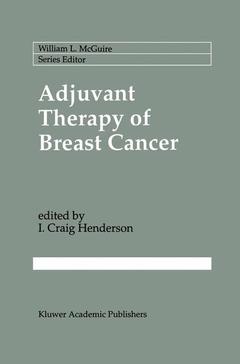Adjuvant Therapy of Breast Cancer, Softcover reprint of the original 1st ed. 1992 Cancer Treatment and Research Series, Vol. 60
Langue : Anglais
Coordonnateur : Henderson I. Craig

The results of randomized trials evaluating the use of early or adjuvant systemic treatment for patients with resectable breast cancer provide an eloquent rebuttal to those who would argue that we have made no progress in the treatment of cancer. Many of the tumors that we have been most successful in curing with chemotherapy and other newer forms of treatment are relatively uncommon. In contrast, breast cancer continues to be the single most common malignancy among women in the western world, is increasingly a cause of death throughout Asia and Third-World countries, and remains one of the most substantial causes of cancer mortality world wide. The use of mammography as a means of early detection has been shown to reduce breast cancer mortality by 25-35% among those popu lations in which it is utilized. The use of adjuvant systemic treatment in appropriate patients provides a similar (and additional) reduction in breast cancer mortality. Few subjects have been so systematically studied in the history of medicine, and it seems fair to conclude that the value to adjuvant systemic therapy in prolonging the lives of women with breast cancer is more firmly supported by empirical evidence than even the more conventional or primary treatments using various combinations ofsurgery and radiotherapy.
I. Rationale and Methods for Studying Adjuvant Systemic Therapy.- 1. Evolving concepts in the adjuvant systemic therapy of operable breast cancer.- 2. Statistical methods for early breast cancer trials.- II. Results of Clinical Studies.- 3. The nature of the benefit.- 4. Adjuvant endocrine therapy of breast cancer.- 5. Adjuvant chemotherapy of axillary lymph-node-positive breast cancer.- 6. The node-negative problem: To treat or not to treat.- III. Special Problems.- 7. Defining the high-risk breast cancer patient.- 8. Models for weighing benefits and toxicities.- 9. Financial considerations in the use of adjuvant chemotherapy.- 10. The use of adjuvant therapy in patients treated with conservative surgery and radiotherapy.- 11. Treating the relapsed patient.- IV. Future Directions.- 12. Unanswered questions in the adjuvant therapy of breast cancer.- 13. Neoadjuvant chemotherapy.- 14. Altering cell kinetics with endocrine therapy.- 15. Polypeptide growth factors: Their potential value in the management of breast cancer patients.- 16. Immunotherapy of breast cancer.- 17. Breast cancer chemoprevention.- Appendices.- I. Consensus statements from panels convened by The National Cancer Institute in 1980, 1985, 1990.- II. List of completed and ongoing randomized clinical trials addressing questions related to the use of adjuvant systemic therapy to treat resectable breast cancer.
'Overall, this book is a useful review Volume containing thoughtful and up-to-date information on the optimal use of adjuvant therapy for breast cancer. It will be a valuable addition to the library of the practicing clinical oncologist.' Journal of the Nat. Cancer Inst. 85:10 1993
Date de parution : 11-2012
Ouvrage de 464 p.
15.5x23.5 cm
Thème d’Adjuvant Therapy of Breast Cancer :
Mots-clés :
adjuvant therapy; cell; clinical trial; immunotherapy; prevention; radiotherapy; surgery; systemic therapy
© 2024 LAVOISIER S.A.S.



